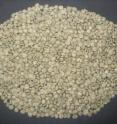Proteins in unroasted coffee beans may become next-generation insecticides
Scientists in Brazil are reporting for the first time that coffee beans contain proteins that can kill insects and might be developed into new insecticides for protecting food crops against destructive pests. Their study, which suggests a new use for one of the most important tropical crops in the world, appears in ACS' Journal of Agricultural and Food Chemistry, a bi-weekly publication. Peas, beans and some other plant seeds contain proteins, called globulins, which ward off insects. Coffee beans contain large amounts of globulins, and Paulo Mazzafera and colleagues wondered whether those coffee proteins might also have an insecticidal effect. The high heat of roasting destroys globulins, so that they do not appear in brewed coffee.
Their tests against cowpea weevil larva, insects used as models for studying the insecticidal activity of proteins, showed that tiny amounts of the coffee proteins quickly killed up to half of the insects. In the future, scientists could insert genes for these insect-killing proteins into important food crops, such as grains, so that plants produce their own insecticides, the researchers suggest. The proteins appear harmless to people.
Source: American Chemical Society
Other sources
- Raw coffee beans tested as insecticidefrom UPIFri, 21 May 2010, 17:10:34 UTC
- Proteins in unroasted coffee beans may become next-generation insecticidesfrom Science BlogThu, 20 May 2010, 15:11:09 UTC
